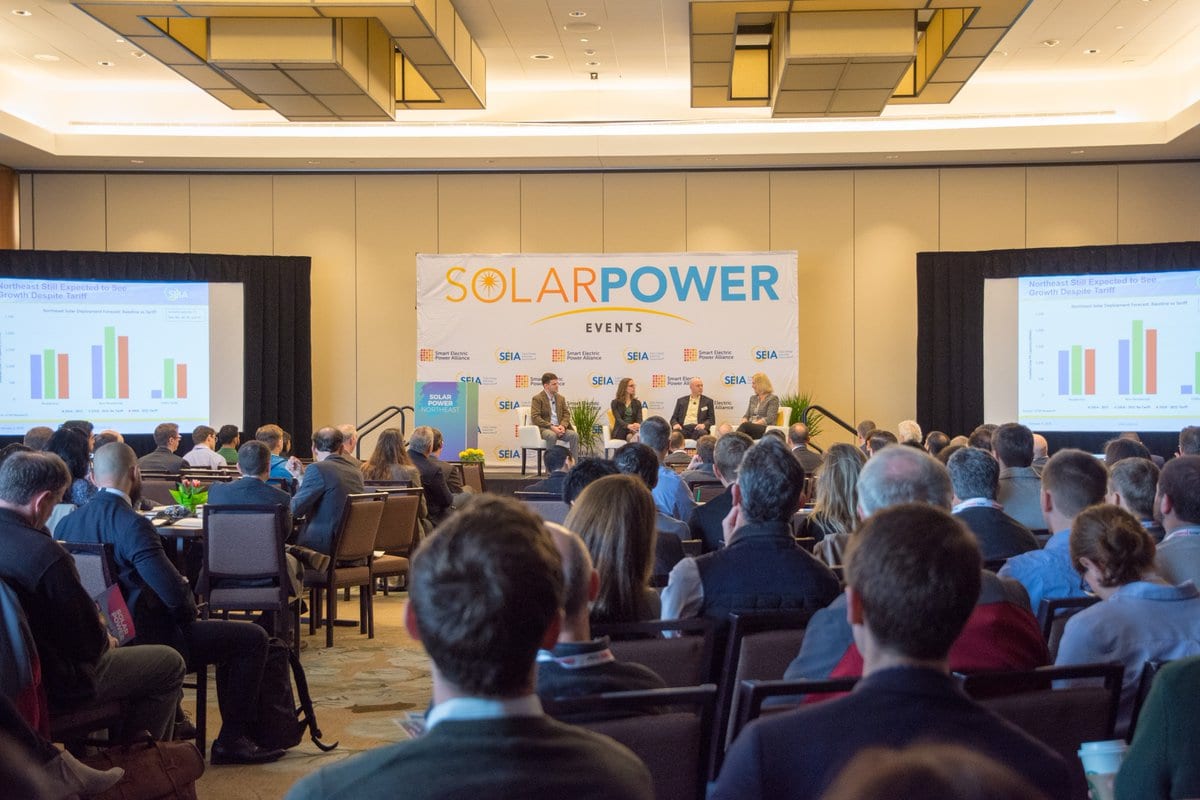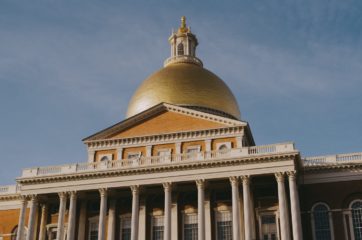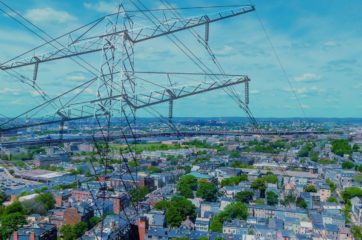by: JONAH KURMAN-FABER COMMUNICATIONS AND POLICY FELLOW
On February 5 and 6th, over 1,500 attendees and 80 exhibitors made their way to the Westin Waterfront Hotel in Boston for Solar Power Northeast 2018. Co-hosted by Solar Energy Industries Association (SEIA) and Smart Electric Power Alliance (SEPA), the event brings together industry representatives and solar experts from all over the country to attend educational sessions, networking events, and explore their massive exhibit hall. All proceeds from the conference “support the expansion of the U.S. PV solar energy market through both associations’ year-round research and education activities.”
The organizers spread a banquet of 25 educational sessions across two days, covering everything solar: policy analysis, grid transformation, business optimization, and market predictions, to name a few. In addition, the conference held several networking events and all-day exhibits where innovative solar-related businesses could demonstrate their ideas and engage other businesses. There was much to discover and learn in just two days, so here are some quick takes on what the solar industry is buzzing about.
UNIFIED OPPOSITION TO TRUMP’S TARIFFS
Amidst the wide variety of educational events, industry representatives were most interested in unpacking recent policy developments and hearing market predictions. Events such as “A Deep Dive: How to make the Massachusetts SMART Program Work for your Business” and “What the Hill is Going on? A Federal Update” drew the biggest crowds of the conference.
With regards to Trump’s Tariffs, SEIA’s message was that the damage can be contained. The tariffs are scheduled for a four year period, but a mid-term review occurs in the 2nd year. If a compelling case is made in opposition, the tariffs could be pulled ahead of schedule. Building a good case against these tariffs can start now – if the tariffs are directly hurting your business, you can join SEIA’s solar jobs campaign to share your story and stay updated on the fight.
Brandon Audap from SEIA also noted that the special election of Senator Doug Jones (D-AL) has the potential to shift a lot of committee seats around. As such, November could be a big opportunities to put more renewable supporters in charge of important committee groups.
STATE AND REGIONAL POLICY – A MIXED BAG
Environmental circles may assume that the solar industry would be unified when it comes to an agenda for local, state, and regional incentive programs. Unfortunately, this is not always the case. In contrast to the Trump tariffs, local policy adds layers of granularity and complexity, meaning that the industry benefits or suffers depending on the business model.
The bottom line is that energy policy, particularly at the state and regional level, is complex and difficult to unpack, even for solar businesses. However, these companies were far more interested in maximizing their profits within these parameters rather than evaluate the policy’s merit. After all, this was a business expo, not a political rally.
While SEIA has been fairly active in the policy arena, businesses at their expo had mixed opinions on their role in state and regional policy. The President of NEO Virtus, a multi-state PV engineering firm, sees political involvement as unnecessary for his business, citing aggressive growth in Maine despite unfriendly changes in solar policy. Some companies sole concern is to comply with local, state, and federal regulations, while ignoring the implications of these policy changes.
Tom Wu of Invaleon Solar, a Haverill-based solar developer, challenges that perspective. “We need to remain vigilant in terms of promoting and protecting local and state incentives and legislation. At the end of the day, markets and jobs are created locally.” Particularly in the wake of federal action against renewable industries, SEIA has strongly pushed for better solar action in Massachusetts.
WHERE IS THE MARKET HEADING?
Amidst the complexity of the current policy arena, every business wants to know what the market will look like for the next 5 years. In addition to all the ambition, innovation, and confidence exuded at this conference by industry experts and professionals, businesses have to stay on their toes amidst policy changes.
A recent report by the Solar Foundation found that the U.S. lost 10,000 solar jobs in 2017, the first decline in industry history. Massachusetts was hit particularly hard, losing 21% of its solar workforce in a year. Most of these losses were on the “demand side” – installation, sales, and distribution businesses.
The main culprit? Changes in policy. 2016 was a record-setting year, as companies raced to exploit a federal solar tax credit set to expire in 2017. While the tax credit was ultimately renewed, companies had already planned reduced workloads. Additionally, the report attributes some job loss to “jitters” about the impending solar tariff.
Massachusetts is primed to rebound if we can pass substantive legislation. The Senate’s clean energy omnibus bill released Monday would be an enormous step towards expanding our renewable energy sectors, hitting aggressive emissions reduction targets, and preparing our coasts for climate change impacts. If this expo was any indication, the solar industry has unified in opposition to federal setbacks – to make real progress, we’ll need them to unify in support of good state initiatives as well.
 JONAH KURMAN-FABER COMMUNICATIONS AND POLICY FELLOW
JONAH KURMAN-FABER COMMUNICATIONS AND POLICY FELLOW
Jonah is currently a Masters candidate of Sociology at Northeastern University, where he completed his Bachelors. He developed an appreciation for the environment at a young age, growing up on Lake Massapoag in Sharon, MA. He recently held multiple positions at Oxfam America as a grasstops and grassroots organizer, prior to which he served as an outreach coordinator for the Mass Save program. His academic expertise includes renewable energy policy, urban development, and gerrymandering. In his spare time, Jonah enjoys playing/coaching Ultimate Frisbee, traveling, and eating food he can’t afford.









